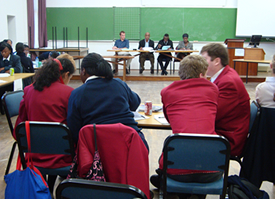| 42% of getS.E.T.go! readers think that the development of a 3D touch screen is a great idea and an exciting development for science. | |
| 17% are indifferent. | |
| 40% think it’s a waste of money and a gimmick. |
It is estimated that South Africa’s new Science & Technology Train, which is currently under development, will reach 14 000 learners each year.
Transnet Rail Engineering at Koedoespoort will complete the train’s renovations.
Discovering science in the art of debate
 |
SAASTA’s Lorenzo Raynard (right), with Luke Hannan, one of the participants in the Eastern Cape Provincial round of the debating competition and Sibusiso Khosa (left) of Model United Nations of South Africa (MUNSA). |
|
 |
Hard at work … learners in the provincial rounds of the debating competition, who are vying for a spot in the national championship that takes place in Johannesburg on 27 August. |
Will a DNA database curb South Africa’s crime problem? And is “smaller” really “better”? These are just two of the tough-talking topics being dissected and debated by learners from grades 9 to 11 in the Provincial rounds of the SAASTA National School Debates competition, currently underway.
Sometimes, great arguments can do a world of good! SAASTA’s National School Debates competition has got learners thinking and talking about all sides of several stories, in the process helping them to get to grips with concepts of nanotechnology, biotechnology in forensics and the implications surrounding the science.
The style of debate requires the learners to research their topics and formulate ideas beforehand. They are required to take a stance on each of the topics and argue their point based on social, cultural, economic and broader perspectives.
Through the debate, the learners formulate a conference paper in which they work together to put forward arguments in support of their view. In this way, the debate develops research and critical thinking skills, as well as confidence and assertiveness.
This form of debate is an ideal tool with which to engage learners on scientific issues and provide a platform for making scientific information relevant to them. The project specifically aims to establish a generation of informed communicators who can help counter the misinformation and misconceptions that often form part of debates on scientific topics.
And so far, it seems to be working.
The learners say they have found the experience challenging, but enriching. They all concur that research is essential and the more prepared teams have the upper hand.
“I am very impressed with the manner in which the learners showcased their abilities and talent in debating issues that are problematic in our day-to-day life,” says Mthuthuzeli Zamxaka, project coordinator of the Nanotechnology Public Engagement Programme, and who attended the Western Cape Provincial competition.
To date, the Western Cape, North West, Eastern Cape and Free State provinces have completed their round of competitions. One winner from each of the nine provinces will go forward to compete at the National competition in Johannesburg on 27 August 2011.
